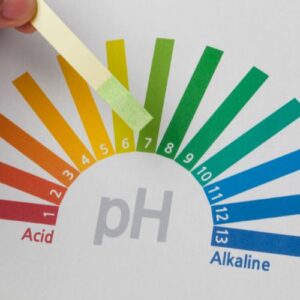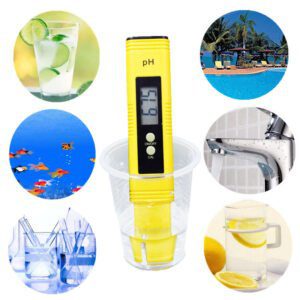pH Level of Water in Cyprus: A Comprehensive Guide
When it comes to water quality, the pH level is an essential factor that directly impacts the taste, odor, color, and overall safety of the water. In the beautiful Mediterranean island of Cyprus, understanding the pH level of water holds significant importance for both human health and the preservation of the island’s unique ecosystems.
1. What Is pH?
 The term ‘pH’ stands for ‘potential of hydrogen.’ It refers to the hydrogen ion concentration within a solution like water, determining how acidic or alkaline that solution is. On a scale ranging from 0 (highly acidic) to 14 (highly alkaline), a pH of 7 is considered neutral. This scale is logarithmic, which means each unit change equates to ten times the acidity or alkalinity.
The term ‘pH’ stands for ‘potential of hydrogen.’ It refers to the hydrogen ion concentration within a solution like water, determining how acidic or alkaline that solution is. On a scale ranging from 0 (highly acidic) to 14 (highly alkaline), a pH of 7 is considered neutral. This scale is logarithmic, which means each unit change equates to ten times the acidity or alkalinity.
2. The Importance of pH in Cypriot Water
The pH level of water in Cyprus plays a crucial role in affecting various characteristics of the water we consume. For instance, it can change the taste, with extreme pH levels imparting a metallic or bitter taste to the water. Additionally, pH also influences the corrosiveness of water, which can lead to potential metal contamination from pipes and fixtures, particularly in older buildings.
3. Factors Influencing the pH Level of Cypriot Water
Several factors, both natural and human-induced, influence the pH level of water in Cyprus. Natural factors include the geology of the island, rainfall, and local biological processes, all of which can cause variations in local water sources’ pH. Human activities such as mining, industrial waste disposal, and certain agricultural practices can also impact the pH levels of water in the region.
4. Water Sources and pH Level in Cyprus
Cyprus gets its water supply from several sources, including groundwater, surface water, and desalinated water. Each of these sources can have varying pH levels. Groundwater’s pH can be influenced by natural geological formations and human activities such as agriculture and waste disposal. Surface water, from lakes and rivers, is often affected by atmospheric conditions, local flora and fauna, and runoff from surrounding areas. Finally, desalinated water, crucial to Cyprus’ water supply due to its geographic location, typically needs pH adjustment post-treatment to prevent pipe corrosion.
5. Regular pH Testing and Cyprus Water Quality Standards
Maintaining optimal pH levels is paramount to ensure safe water consumption. Regular pH testing allows for early detection and rectification of any changes that may occur due to environmental or human factors. In Cyprus, water quality standards are quite stringent, with regular checks conducted to ensure the safety of the populace. These standards take into account several parameters, including the pH level.
Testing the pH Level of Water in Cyprus
To ensure the quality of Cyprus’ water, regular pH testing is crucial. Check out our wide range of products for pH testing your water at waterfilternet.com.

6. pH Imbalance Issues and Their Resolution in Cyprus
Certain regions in Cyprus have encountered issues related to pH imbalance in water in the past. These issues can lead to problems like pipe corrosion, unpleasant taste, and even health hazards. Active measures are being taken to rectify these problems, ensuring the pH balance is maintained for the safe consumption of water.
7. The Role of Community Participation in Maintaining pH Balance
The citizens of Cyprus play a vital role in maintaining water quality. Reporting any noticeable changes in the taste, odor, or color of the water to local water authorities is a key part of community participation. Such active involvement helps in early detection and rectification of potential pH imbalances.
8. pH Levels and Aquatic Life in Cyprus
Beyond human consumption, the pH level of water plays a significant role in supporting aquatic life. An optimal pH range helps in maintaining a healthy ecosystem within Cyprus’ unique marine and freshwater habitats.
FAQs
- What is the pH level of pure water in Cyprus? The pH of pure water, even in Cyprus, is 7 – a neutral level.
- Does the pH level of water affect its taste in Cyprus? Yes, extreme pH levels can alter the taste of water in Cyprus, giving it a metallic or bitter taste.
- How often should I test the pH of my drinking water in Cyprus? It is advised to test your drinking water at least once a year in Cyprus.
- Can I adjust the pH level of my tap water in Cyprus? Yes, you can adjust the pH of your tap water in Cyprus using proper tools and substances.
- What can happen if the pH level of drinking water in Cyprus is too high or too low? If the pH level is not balanced, water can become corrosive, leading to potential metal contamination. It can also impact the water’s taste and smell.
- How is the water quality maintained in Cyprus? Cyprus maintains water quality through rigorous checks in compliance with water quality directives, which also includes maintaining optimal pH levels.
- Are there specific pH related issues in Cyprus? Certain regions may experience pH imbalances leading to pipe corrosion and unpleasant taste. However, these issues are usually addressed promptly.
- How important is the pH level for aquatic life in Cyprus? pH level is crucial for aquatic life. An optimal pH helps maintain a healthy ecosystem in Cyprus’ marine and freshwater habitats.
- Can community participation help in maintaining optimal pH levels? Yes, residents reporting changes in water taste, odor, or color can help in early detection of pH imbalances.
- How does desalination impact the pH level of water in Cyprus? Desalinated water typically needs post-treatment pH adjustment to prevent pipe corrosion.
Conclusion
In conclusion, understanding the pH level of water in Cyprus is crucial not just for ensuring the quality and safety of drinking water but also for preserving the island’s rich biodiversity. By regularly testing and, if needed, adjusting pH levels, we can ensure that the water in Cyprus remains suitable for consumption and supportive of its unique ecosystems.
- How do you use SodaStream Duo – Step by Step Guide? - February 6, 2024
- Why Choose Tankless Systems? Discover the Best Tankless Reverse Osmosis Systems in Cyprus - December 18, 2023
- Comparison of Chlorine vs Chlorine Dioxide: Which is the Superior Sanitizer? - June 25, 2023
